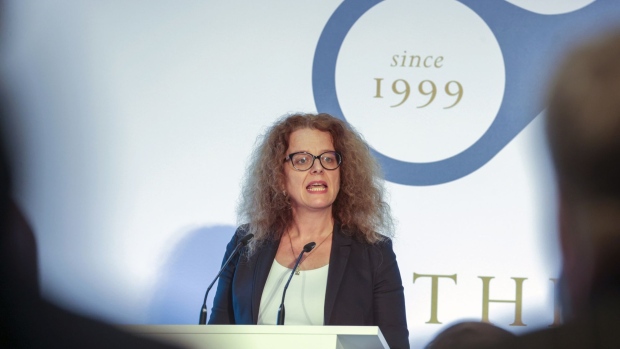Aug 27, 2022
Schnabel Says Forceful Action Needed to Prove ECB Determination
, Bloomberg News

(Bloomberg) -- European Central Bank Executive Board member Isabel Schnabel urged policy makers to act forcefully to bring stubbornly high inflation back under control and warned against retreating at the first sign that price pressures may ease.
Risks are increasing that inflation expectations are becoming unanchored, threatening to undermine confidence in the central bank, she said during a panel at the Federal Reserve’s Jackson Hole symposium Saturday. With the economy likely facing larger, more persistent and more frequent shocks in the future as long-standing economic realities turn, monetary policy needs to focus on protecting price stability, leaving to fiscal policy the job of creating the foundations for resilient growth.
“Both the likelihood and the cost of current high inflation becoming entrenched in expectations are uncomfortably high,” Schnabel said. “In this environment, central banks need to act forcefully. They need to lean with determination against the risk of people starting to doubt the long-term stability of our fiat currencies.”
She added that “policy makers should also not pause at the first sign of a potential turn in inflationary pressures, such as an easing of supply chain disruptions. Rather, they need to signal their strong determination to bring inflation back to target quickly.”
The comments feed into a starting debate among ECB officials over the most appropriate strategy to take back control over an inflation rate that’s approaching 10%. The Governing Council lifted rates by half a point in July, and less than two weeks ahead of their September meeting, officials including Austria’s Robert Holzmann and Klaas Knot from the Netherlands argue a three-quarter point move should at least be considered.
Schnabel didn’t express a preference on the size of the ECB’s next move.
Governing Council member Francois Villeroy de Galhau argued during the same panel that policy makers must be determined in tackling record inflation to avoid being forced into “unnecessarily brutal” interest-rate moves later on. Sustained hikes will be necessary at least until borrowing costs reach a level at which they neither stimulate nor constrain the economy -- something that may happen “before the end of the year, after another significant step in September.”
Schnabel argued that much speaks in favor of central banks act determinedly, even if that means risking lower growth and higher joblessness because that “robust control” approach reduces the risk of “very bad economic outcomes in the future.”
A paradigm shift might be needed to keep economies prospering in the future, according to Agustin Carstens, who heads the Bank for International Settlements. The pandemic and war in Ukraine have proved a “rude awakening” for central banks, which had assumed for too long that supply adjusts automatically and smoothly to shifts in demand, he said Friday at the same event.
Schnabel echoed his remarks that monetary officials should focus primarily on tackling inflation while leaving it to governments to nurture innovation and resilience, and shepherd necessary institutional, technological and ecological transitions.
©2022 Bloomberg L.P.






